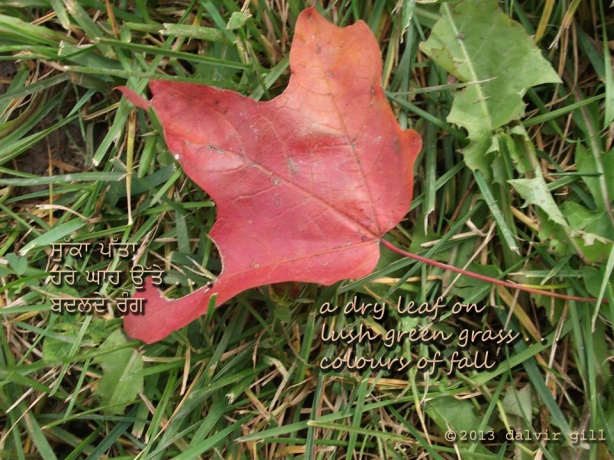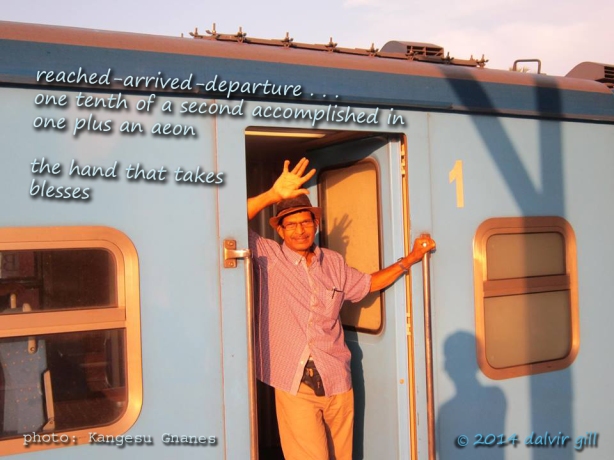withered roses . . .
amid slew of wanders
alone
Archive for May, 2014
Alone
Posted: May 17, 2014 in Dalvir Gill, Dalvir Gill, Dalvir Gill, Haiga, Haiku, Photography, WriterTags: Dalvir Gill, Dalvir Gill Haiga, Dalvir Gill Haiku, Haiga, haiku, Photography, Poetry Dalvir Gill
Oneness
Posted: May 15, 2014 in Dalvir Gill, Dalvir Gill, Dalvir Gill, Haiga, Haiku, Haiku Punjabi, Photography, WriterTags: Dalvir Gill Haiga, Dalvir Gill Haiku, Haiga, haiku, Haiku Punjabi, Photography, Poetry Dalvir Gill

a dry leaf on
lush green grass . . .
colours of fall
ਸੁੱਕਾ ਪੱਤਾ
ਹਰੇ ਘਾਹ ਉੱਤੇ . . .
ਬਦਲਦੇ ਰੰਗ
The Journey
Posted: May 14, 2014 in Dalvir Gill, Dalvir Gill, Haiga, Tanka, WriterTags: Dalvir Gill, Dalvir Gill Haiga, Haiga, Photography, Poetry Dalvir Gill, Tanka

reached-arrived-departure . . .
one tenth of a second accomplished in
one plus an aeon
the hand that takes
blesses
Self-Analysis i…
Posted: May 10, 2014 in Brain-Droppings, Dalvir GillTags: Brain-Droppings, Dalvir Gill
Self-Analysis is not an element of, essence of, but, a synonym of Religion.
dalvir gill
Grace Walk
Posted: May 10, 2014 in Dalvir Gill, Dalvir Gill, Haiku, Hokku, Photography, WriterTags: Dalvir Gill, Dalvir Gill Haiga, Dalvir Gill Haiku, Haiga, haiku, Hokku, Photography, Poetry Dalvir Gill
.
http://haikureality.theartofhaiku.com/haikuodab9.htm
English-Language Editor and Selector: Robert D. Wilson
ANNOUNCEMENT OF THE BEST HAIKU OF THE ISSUE
The selector—Robert D. Wilson—has made his choices of the best haiku of the issue (36 authors from 10 countries submitted 192 poems).
Iran (11), USA (6), Croatia (5), India (5), Serbia (4), Tunisia (1), Israel (1), France (1), Canada (1), Australia (1).
PROGLAŠENJE HAIKUA BROJA
Selektor—Robert D. Wilson—je izabrao najbolje haikue broja (36 autora iz 10 zemalja je poslalo 192 pesme).
Iran (11), SAD (6), Hrvatska (5), Indija (5), Srbija (4), Tunis (1), Izrael (1), Francuska (1), Kanada (1), Australija (1).
BEST OF ISSUE (First Choice)
Najbolji haiku broja (prvoplasirani)
Dalvir Gill, India (Indija)
metal eyes . . .
dawn painting the wings
of an egret
metalne oči…
zora oslikava krila
bele čaplje
tr. SV
Dalvir Gill’s poem is a hokku. It is activity-biased (koto, objective). Centric to the poem is not an object, nor the description of said object. “metal eyes”: What are the metal eyes? Are they a metaphor for a military weapon? Are they eyes reflecting the sun? Are they an insect’s eyes? Gill’s first line sets the stage for an effective juxtaposition, exuding mystery (yugen), stimulating the reader’s imagination and culturally influenced tabula.
dawn painting the wings
of an egret
Juxtaposing line one with lines two and three, elevates the poem into a tidal arena, a canvas where nothing is as it seems, nothing is static, the canvas never dry. The poet composes the poem. It is the reader’s job to interpret the poem subjectively.
My interpretation of this hokku will be different than yours. Like you, cultural memories, levels of experience, education, and exposure to geographic biospheres, vary.
If I can interpret Gill’s hokku exactly as he interprets it, the poem is a failure. Gill’s use of pre-Meiji era Japanese aesthetics (yugen, ma, makoto, etc.) evokes a surplus of interpretation. That is why Basho’s hokku are memorable and revered today as genuine literature, unlike haiku which goes into one side of the head and out the other side. How many haiku do you remember?
Become the egret without Western German university-based preconceptions. View dawn through his eyes. Watch zôka (nature’s creative force) paint the egret’s wings. A metaphor? An actual event? Metaphor and real?
How do the metal eyes relate to dawn painting an egret’s wings?
***
Dalvir Gillova pesma je hoku. Fokusira se na radnju (koto, objektivna je). Pesma se ne orijentiše na objekat niti na njegov opis. „matalne oči“: Šta su metalne oči? Jesu li one metafora za vojno oružje? Jesu li one oči u kojima se ogleda sunce? Jesi li one oči insekta? Prvi stih Gillove pesme stvara uslove za efektivnu juktapoziciju, koja odiše tajnom (jugen), postiče maštu čitaoca i kulturno uslovljeni način razmišljanja.
zora oslikava krila
bele čaplje
Postavljanje prvog stiha uz druga dva uzdiže pesmu na plimsku scenu, platno na kome ništa nije kako se čini da je, ništa nije statično, platno koje se nikad ne suši. Pesnik svara pesmu. Zadatak čitaoca je da je subjektivno protumači.
Ja ću ovaj hoku protučamiti drugačije od vas. Kao vi, tako se razlikuju i kulturna sećanja, iskustva, novoi obrazovanja i geografske oblasti u kojima čitaoci i pisci žive.
Ako protumačim Gillov hoku baš onako kako ga on tumači, onda pesma nije uspela. Njegovo korišćenje japanske estitike iz vremena pre Meiđi ere (jugen, ma, makoto itd) dozvoljava mnoga tumačenja. Zbog toga se Bašoovi hokui danas pamte i duboko poštuju kao prava književnost, za razliku od haikua koji ulaze na jedno a izlaze na drugo uvo. Koliko haikua pamtite?
Postanite čaplja bez predrasuda zasnovanih na učenju nemačkog univerzitetskog sistema. Posmatrajte zoru njegovim očima. Posmatrajte kako zôka (kreativna sila prirode) oslikava krila bele čaplje. Metafora? Stvarni događaj? Metafora i realno?
U kakvoj su vezi metalne oči i zora koja oslikava krila bele čaplje?
BEST OF ISSUE (Second Choice)
Najbolji haiku broja (drugoplasirani)
Sandip Chauhan, USA (SAD)
twilight . . .
in the earth’s bosom
fallen petals
suton…
u nedrima zemlje
pale latice
tr. SV
Sandip Chauhan’s poem is a hokku as well. It is activity-biased. The poem begins with a mystery to solve: Twilight: dawn or dusk?
in the earth’s bosom
fallen petals
Petals falling from a flower indicate the fragility and non-permanence of everything in nature.”The earth’s bosom” suggests petals in a state of decomposition. How does twilight affect the falling of petals? What does this hokku tell you, the reader, about your own life?
What was once indicative of pure beauty and the emergence of new life, has been reduced to something that is in a state of becomingness: petals fall, decompose, return to the earth that bore them, fertilizing the earth, preparing it to give birth to new life. Nothing stops, all is non-static.
Makoto, yugen, and ma stir a reader’s minds. What looks deceptively simple, is, in reality, complex with layers of meaning.
***
I pesma Sandip Chauhan je hoku. Fokusira se na radnju. Pesma započinje misterijom koju treba rešiti: Sumrak: svitanje ili suton?
u nedrima zemlje
pale latice
Latice koje otpadaju sa cveta ukazuju na krhkost i nestalnost svega u prirodi. „Nedra zemlje“ ukazuju na latice u stanju raspadanja. Kako suton utiče na opadanje latica? Šta ti ovaj hoku govori, čitaoce, o tvom vlastitom životu?
Ono što je nekad ukazivalo na čistu lepotu i nastajanje novog života svedeno je na nešto što je u stanju nastajanja: latice otpadaju, raspadaju se, vraćaju zemlji koja ih je stvorila, obogaćuju je, pripremaju da stvori novi život. Ništa se ne zaustavlja, ništa nije statično.
Makoto, jugen i ma navode čitaoca na razmišljanje. Ono što se čini da je jednostavno je, zapravo, usložnjeno slojevima značenja.
BEST OF ISSUE (Third Choice)
Najbolji haiku broja (trećeplasirani)
Amin Adibi, Iran
from far away
as if another moon…
ship’s window
iz delaka
kao još jedan mesec…
prozor broda
tr. SV
Amin Adibi’s poem is an activity-biased hokku.
“from far away”: where is the poet positioned?
What is he watching? Why does the “ship’s window” remind the poet of a moon, let alone, ANOTHER, moon? I sense loneliness and longing. Is it an abandoned ship, or a moored ship anchored across a harbor? The “ship’s window”.
***
Pesma Amin Adibija je hoku koji se fokusira na radnju.
„ iz daleka“: gde se nalazi pesnik?
Šta posmatra? Zašto ga „brodski prozor“ podseća na mesec, a kamoli na JOŠ JEDAN mesec? U ovoj pesmi slutim usamljenost i čežnju. Da li je brod napušten ili usidren u luci? „Brodski prozor“.
FAVORITES
Kandidati za najbolje haikue
Damir Damir, Srbija (Serbia)
na obodima
iščezlog sna … već dugo
glas kukavice
at the edges
of a faded dream… for too long
the cuckoo’s cry
Keith A. Simmons, France (Francuska)
autumn dusk…
a cat’s eyes absorb
the darkness
jesenji suton…
mačkine oči upijaju
tminu
tr. SV
Angelee Deodhar, India (Indija)
shooting star
how will you carry my wish
as you die?
zvezda padalica
kako ćeš preneti moju želju
dok gasneš?
tr. SV
Sandip Chauhan, USA (SAD)
mango blossoms . . .
all day the bulbul’s song
rises and fades
cvetovi manga…
čitavog dana poj slavuja
se glasa i gubi
swimming in
the scent of marigold . . .
an ounce of soul
pliva u
mirisu nevena…
nešto duše
tr. SV
Massih Talebian, Iran
galloping a horse
toward the Damavand,
moon on its back
konj u galopu
prema Damavandu
na leđima mu mesec
hometown…
blossoms in the
moon’s solitude
rodni grad…
cvetovi u
samoći meseca
tr. SV
Hengameh Ahmadi, Iran
crow nest-
hidden again among
young leaves
gnezdo vrane –
opet skriveno
u zelenom lišću
tr. SV
Beate Conrad, USA (SAD)
Vernal lightning
the willow by the river
as if still standing
prolećna munja
vrba kraj reke
kao da još uvek stoji
rising stars
echoes lingering
from the past
zvezde u usponu
zadržavaju se odjeci
iz prošlosti
tr. SV

